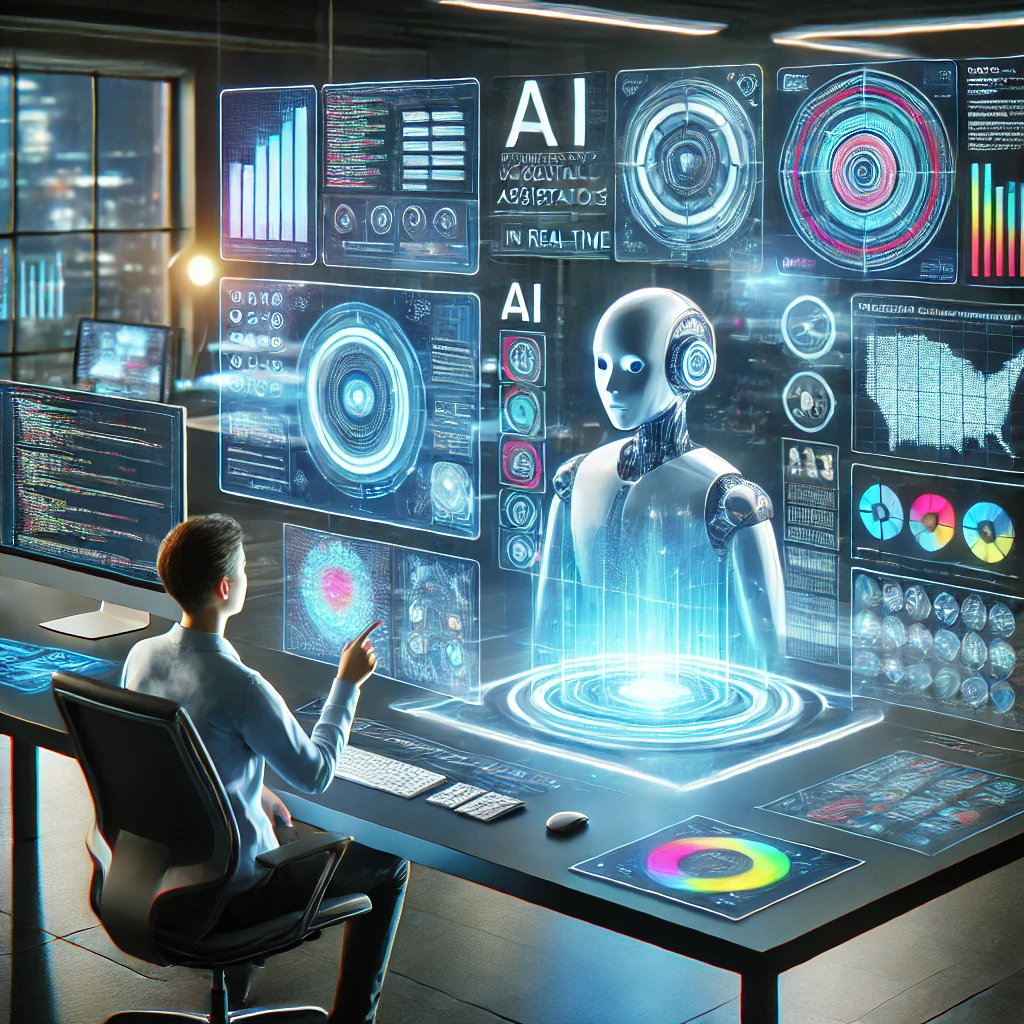How AI Agents Are Redefining Professional Workflows

AI Agents: Transforming Complex Tasks with Next-Generation Automation
In the rapidly evolving world of artificial intelligence, AI agents capable of performing complex tasks have emerged as one of the most significant developments in recent months. These cutting-edge systems go far beyond simple automation, handling multi-step tasks like coding, design, and data analysis autonomously.
Unlike traditional automation tools, these AI agents are equipped to operate independently, responding to user input with sophisticated decision-making abilities and adaptability.

With big tech companies like Microsoft, Amazon, and Anthropic making substantial investments in AI agent technology, it’s clear that these systems are reshaping the way we approach digital work. AI agents, such as Claude by Anthropic and Microsoft’s Copilot, promise to increase productivity, streamline creative processes, and drive new levels of innovation by taking on tasks that traditionally required human intelligence.
This article delves into the world of AI agents, explaining their capabilities, highlighting leading tools, examining challenges, and exploring the potential impact they might have on industries worldwide.
What Are AI Agents, and How Are They Different?
AI agents are autonomous software systems designed to execute complex tasks based on input and learned behavior. What sets them apart from basic automation tools is their ability to operate independently, make decisions, and adapt to different situations, even if they’re operating outside pre-set commands.
Built on large language models (LLMs) and advanced algorithms, these agents can follow complex instructions, understand natural language, and generate human-like responses, all while learning from their own experiences over time.
This kind of intelligence makes AI agents highly versatile and suited for handling tasks that once required human oversight. For example, Autonomous AI Systems can now draft and edit code, create design layouts, or analyze vast datasets for insights. Unlike simpler software that automates repetitive actions, AI agents can:
- Engage in Multi-Step Processes: By following a sequence of actions or adapting based on new input, AI agents can handle tasks that would otherwise require multiple human interactions.
- Learn and Improve Over Time: Through machine learning, these agents can improve their performance as they analyze data and feedback, enhancing their efficiency and accuracy.
- Adapt to User Preferences and Context: Advanced agents, like Claude, adjust their responses based on user tone, previous interactions, and contextual information, providing a more tailored and efficient experience.
For instance, Claude by Anthropic is a conversational agent designed to prioritize ethical alignment and safe interactions, excelling in customer service and data analysis tasks. Microsoft’s Copilot, another leading Intelligent Digital Assistants, integrates directly into tools like Office Suite and Azure, assisting with complex coding, data analysis, and even administrative tasks within business applications. This functionality allows Copilot to streamline processes, reduce human workload, and enable companies to scale their digital operations efficiently.
With capabilities like these, AI agents are changing how businesses approach problem-solving, creative work, and strategic decision-making. And as more industries adopt these tools, the range of tasks AI agents can handle is set to expand, redefining roles and productivity standards across sectors.
Key Players and Noteworthy AI Agents
Several leading tech companies and AI innovators are at the forefront of this AI agent revolution. By investing in cutting-edge autonomous systems, they are enabling the use of AI agents for everything from coding and analysis to customer support and creative design. Here are some of the most prominent players and their flagship AI agent tools:
1. Claude by Anthropic
Anthropic, a well-known AI research company, developed Claude as a conversational agent that’s highly effective for tasks requiring interaction and data interpretation.
Designed with a focus on safe and ethical AI, Claude can interpret complex queries, generate responses, and even handle sensitive information with a safety-first approach. Claude is frequently used in fields such as customer service, content creation, and data analysis, offering businesses an AI that’s both effective and aligned with ethical standards. Its capabilities allow it to assist users with customer support and automated content, making it an asset in industries where high-quality, responsive communication is vital.
2. Microsoft Copilot
Microsoft’s Copilot is transforming productivity within business environments, particularly in coding and data analytics. Integrated across the Microsoft Office Suite and Azure, Copilot assists with tasks ranging from code generation to spreadsheet analysis and data management.
For developers, it can expedite software creation by completing code, identifying errors, and suggesting optimizations. In business analytics, Copilot helps users analyze large datasets, generate insights, and summarize complex information. Microsoft’s AI capabilities, combined with cloud-based tools, are allowing companies to use Copilot as a robust virtual assistant, streamlining both technical and administrative workflows.
3. Amazon’s AI Agents in AWS
Amazon’s cloud platform, AWS, includes several AI-driven tools designed to support infrastructure management, supply chain optimization, and customer service. Amazon’s AI agents can manage large-scale operations, analyze customer interactions, and streamline supply chain processes.
This is invaluable for industries that rely on real-time data processing and decision-making, such as e-commerce and logistics. By integrating these AI agents, businesses can cut down on labor-intensive tasks, improve response times, and gain actionable insights from large volumes of data without manual input.

Real-World Use Cases: Coding, Design, and More
As AI agents become more capable, they’re being adopted across various industries to take on complex tasks that were previously managed by skilled human labor. Here are a few of the most promising applications of AI agents today:
1. Coding Assistance One of the most transformative applications of AI agents is in software development. Coding agents like Microsoft’s Copilot and Claude by Anthropic streamline the programming process by suggesting code, detecting bugs, and providing optimization suggestions.
By handling repetitive and time-consuming coding tasks, these agents allow developers to focus on higher-level problem-solving and innovation. The automation capabilities of these agents also mean fewer human errors and faster project turnaround times, making them indispensable in fast-paced development environments.
2. Design Automation In the design world, AI agents have started to play a role in creating visuals, testing layouts, and even adhering to brand guidelines. For instance, some AI agents can generate images, propose color palettes, or optimize content for various platforms—all based on simple text inputs. Design AI tools save time and help designers produce polished results, making them valuable for agencies and marketing teams. By experimenting with different layouts or styles, designers can quickly explore creative options, accelerating the creative process and allowing for rapid iteration.
3. Enhanced Data Analysis AI agents are also invaluable in business intelligence and data analysis, where they can process vast amounts of data and provide actionable insights. AI agents assist in predicting trends, identifying customer preferences, and optimizing marketing strategies. With the ability to analyze data in real-time, businesses can respond more quickly to market changes and make data-driven decisions. For example, an e-commerce business could use an AI agent to recommend products to customers based on browsing patterns or to optimize stock levels based on sales forecasts.

Challenges and Considerations
Despite their immense potential, AI agents face several key challenges that need to be addressed for broader, more reliable adoption. Here’s a look at some of the most pressing issues in the field of autonomous AI:
- Accuracy and Reliability AI agents are heavily reliant on the quality and quantity of data they are trained on. If data sources are biased, incomplete, or outdated, AI agents may produce inaccurate or even harmful results. Ensuring that AI agents provide accurate, consistent outcomes requires continual updates, quality checks, and training. This is particularly important for tasks where errors can have serious consequences, such as legal or financial advisories.
- Ethical and Security Concerns As AI agents take on more roles, concerns around data privacy, intellectual property, and decision transparency are increasing. Businesses using AI agents must ensure that they comply with data privacy laws, such as GDPR and CCPA, and that sensitive information is stored and processed securely. Additionally, the algorithms behind these AI agents need to be designed with transparency in mind, so users understand how decisions are made, especially in sensitive applications like healthcare and legal consulting.
- Human Oversight AI agents excel in certain tasks but lack the nuanced judgment and empathy that humans bring to complex situations. In many fields, such as customer service or design, human oversight is essential to ensure the quality and accuracy of outputs. For instance, while an AI agent can design a graphic based on parameters, it may still miss subtle branding guidelines or stylistic nuances that only a human eye can detect. Human supervision also acts as a safeguard to catch errors and make ethical adjustments as necessary.
- Dependency on Technical Infrastructure AI agents are complex and require robust technical infrastructure to operate effectively. Companies may need advanced cloud computing services, data storage solutions, and cybersecurity measures to implement these agents on a large scale. Not all businesses are equipped to handle these technical requirements, which may limit the widespread adoption of AI agents.

Future Potential: What’s Next for AI Agents?
The future of AI agents looks promising, with new advancements on the horizon that could make these tools even more powerful and versatile. Here are some trends that are likely to shape the evolution of AI agents in the coming years:
- Expansion into Specialized Fields As AI agents become more sophisticated, they are likely to expand into highly specialized areas like legal analysis, healthcare diagnostics, and financial planning. AI agents in healthcare, for instance, could assist in preliminary patient assessments, analyzing symptoms and recommending treatments based on vast amounts of medical data. In legal fields, AI agents could conduct preliminary case research, providing lawyers with pertinent information while saving time on manual tasks.
- Increased Personalization and Adaptability Future AI agents may be able to adapt more effectively to individual user preferences and context, leading to a highly personalized user experience. With advancements in reinforcement learning and adaptive AI, these agents could respond not just to specific commands but to personal habits and goals. This would make them valuable in educational settings, where they could tailor content to a student’s learning style, or in marketing, where they could customize campaigns based on consumer behavior.
- Integration with Physical Robotics AI agents are primarily software-based, but there’s potential for these agents to integrate with physical robotics for applications in fields like manufacturing, logistics, and elderly care. Combining AI agents with robotics could automate complex tasks that require both cognitive and physical skills. For example, a manufacturing robot equipped with an AI agent could troubleshoot technical issues, adjust workflows autonomously, and communicate with human workers for more efficient production processes.
- Focus on Ethical and Transparent AI With the increasing impact of AI agents on society, future developments will likely focus on ethical AI and transparency. This will involve creating AI systems that are not only effective but also designed to be fair, explainable, and aligned with ethical standards. Transparent AI models, for example, would allow users to understand how decisions are made, fostering trust and reducing biases. Researchers and developers are working on AI explainability frameworks to ensure that as AI agents grow more powerful, they remain aligned with societal values.

Conclusion
AI agents capable of handling complex tasks are revolutionizing industries, from tech and finance to healthcare and customer service. These advanced tools promise to increase productivity, optimize workflows, and support creative workon a scale previously thought impossible. As companies like Microsoft, Amazon, and Anthropic cnnovate in this space, we can expect AI agents to become more reliable, adaptable, and specialized.
However, as with any powerful technology, the responsible deployment of AI agents is crucial. Addressing accuracy, ethics, and infrastructure challenges will determine how effectively these agents can integrate into our daily lives and professional settings. The future of AI agents is not just about what tasks they can handle but about creating a framework that ensures their safe, ethical, and effective use.
For more insights on the latest in AI trends and tools, be sure to stay connected with our blog, where we explore how technology is transforming the way we work, learn, and create.









Your point of view caught my eye and was very interesting. Thanks. I have a question for you.